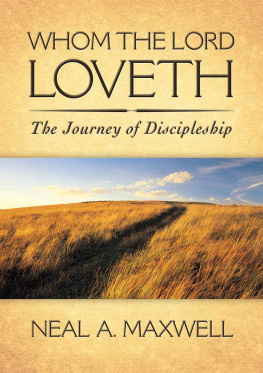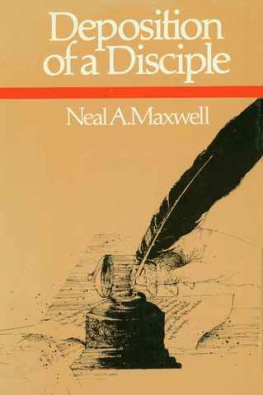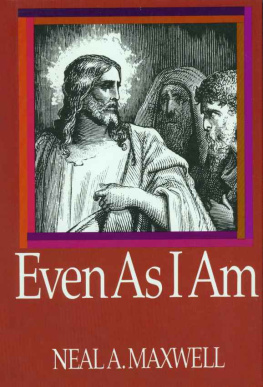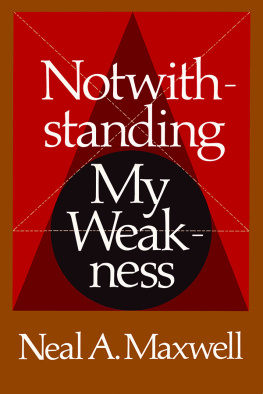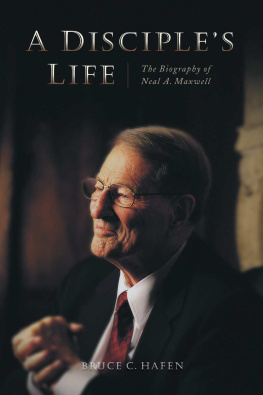To Colleen Fern Hinckley Maxwell
for her constant illumination, which has inspired me for well over half a century now.
In our sunset years, she glows even more brightly.
For whom the Lord loveth he correcteth;
even as a father the son in whom he delighteth.
Proverbs 3:12
Acknowledgments
I alone am responsible for the contents of this volume, which is not an official publication of The Church of Jesus Christ of Latter-day Saints.
Several friends have been kind enough to assist in different ways and are especially deserving of thanks: Susan Jackson, for her patience in retrieving past words and processing new ones while dealing with my unreformed Egyptian handwriting; and William O. Nelson, Edward J. Brandt, and Max H. Molgard, for contributing a doctrinal review with helpful comments. Two other friends, H. E. Bud Scruggs and Elizabeth Haglund, reviewed an early draft of the manuscript and made candid suggestions. Suzanne Brady of Deseret Book diligently performed the tedious but necessary editing.
As always, my only son, Cory H. Maxwell, was helpful in encouraging its completion. Having been allotted but one son, I am grateful it was Cory.
This book is better than it would have been without the touch of these friends.
Introduction
These brief lines focus on doctrines and scripturally based principles especially relevant to the course corrections needed by those of us committed to making the journey of discipleship. Because the Lord loves us enough to correct us, we in turn are instructed to neither be weary of his correction (Proverbs 3:11; 15:10). The format lends itself to topical mobility for the author and accessibility for the reader.
We all need more gospel hope. Greater hope inevitably flows from increased personal righteousness, all of which results from our course corrections and from diminishing our sins of omission. Surely Jesus counsel to the righteous young man, one thing thou lackest, was a call for one course correction in an otherwise good life (Mark 10:21; Luke 18:22). But will we have sufficient faith unto repentance? (Alma 34:15). Because repentance involves changing ones mindwhich of necessity precedes changing ones behavior pondering and applying the doctrines and principles are vital.
The Holy Ghost can teach us, completely and constantly, about things as they really are, and of things as they really will be (Jacob 4:13). He and the scriptures can alert and teach us, promptly and clearly, about any needed course corrections (2 Timothy 3:16). He can also sustain and encourage us as we pursue these refinements while strengthened by the nourishing fruits of the Spiritjoy, peace, and lovesupport so much needed in a world otherwise filled with despair, war, and hate (Galatians 5:22). We can access more fully than we do the gifts of the Holy Ghost, who filleth with hope and perfect love (Moroni 8:26).
Inconveniencedeven stungas we may feel by the periodic reminders of conscience, these are part of the corrective chance given us to measure up afresh. Hope is increased by applying all the doctrines, of course, but especially the deep ones, which are simple and plain and declarative. God truly and personally loves each of us; He has planned for our happiness for a long, long time. Knowing this can cause us to be brim with hope. Evil will not rampage in the world forever unchecked. Meanwhile, we can check its personal effects on ourselves even now.
We can, of course, choose to spurn spiritual course corrections and divine directions, as did some ancients: And the labor which they had to perform was to look; and because of the simpleness of the way, or the easiness of it, there were many who perished (1 Nephi 17:41). Laman and Lemuel didnt really understand Gods dealings with His children (1 Nephi 2:12; Mosiah 10:14). Such inadequate understanding of Gods plans and ways causes some to look elsewhere, erroneously, to alternative ways, which seemeth right unto a man, but the end thereof are the ways of death (Proverbs 14:12).
The encouraging invitations to plow in hope (1 Corinthians 9:10) are surely there, including this glorious incentive: Behold, the way for man is narrow, but it lieth in a straight course before him, and the keeper of the gate is the Holy One of Israel; and he employeth no servant there (2 Nephi 9:41).
The world desperately needs the leavening of righteous disciples, for many simply exist having no hope, and without God in the world (Ephesians 2:12; Alma 41:11). Disciples, however, see with the eye of faith (Alma 5:15), still perceiving divine design even when personal circumstances are shaken like a kaleidoscope. Jesus counsel is to put our hands to the plow and not look back (Luke 9:62). Isaiah advises us that God doth instruct [us] to discretion, and doth teach [us] by precept upon precept and line upon line, confirming the need for course corrections, so that disciples will hold on [their] way, even in a troubled and turbulent world (Isaiah 28:26, 10; D&C 122:9).
With the help of the Holy Ghost, we can glorify Christ by repenting and thereby accessing the blessings of the astonishing Atonement, which He provided for us and at such a stunning cost! (John 16:14). Given what Jesus diedfor, are we willing to live with the challenges allotted to us? (Alma 29:4, 6). Are we willing to make needed course corrections? A trembling response is sometimes both understandable and permissible.
Stretching to Reach the Higher Branches
Happily, many of us have already picked and been greatly nourished by the low-hanging fruit from the gospel tree. Yet, on the higher branches, much fruit still remains, unreached for and unplucked. Neglecting to harvest this fruit deprives us of greater joy and of greater capacity to help others. This further feast includes, for example, those fruits of repentance ripened from correcting our sins of omission. The cease and desist portion of repentance is surely vital but so is doing the good heretofore undone.
The higher hanging fruits also embody the sweet savor of submissiveness, the nourishing nectar of consecration, and the milk of meekness. All these await our stretching grasp and represent the further expressions of love of God for us (1 Nephi 11:2122). This fruit, said Lehi, is most sweet and will make one happy (1 Nephi 8:11, 10; 11:7).
No wonder God, who delight[s] to honor those who will so stretch, urges us onward (D&C 76:5). His own beckoning arm is stretched out and even extended all the day long (D&C 103; Jacob 6:5).
He knows all about stretching (2 Nephi 19:12, 17, 21).
Choice and Fulfillment
Receiving ultimately what we have persistently desired proximately qualifies as personal fulfillmentwidely varied though the individually chosen outcomes will be (Alma 29:4). By then, what we have become will have determined our capacity for joy. Our different-sized cups will be brim but differentially (Alma 26:11). We are the sizers and shapers of those vessels, and the potters cannot blame the potters wheel.
There could be no lasting or real joy, anyway, if some were forced into eternal circumstances they had neither desired nor were now able to enjoy (D&C 88:32). Such an outcome would also be an unjust response to their choices. After all, Christ is the Lord of the Needles Eye, and the words about the straight and narrow pathand few there be that find itare His (Matthew 7:14; 3 Nephi 14:14).
Nonetheless, Gods generosity will still be manifest. Even the telestial kingdom will be a kingdom of glory that surpasses all understanding (D&C 76:89). Furthermore, Gods gift of the universal resurrection to billions and billions of His children will also bring an inseparable connection of body and spirit with all its attendant joys (Alma 11:4344; D&C 93:3334).

